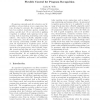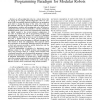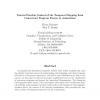164 search results - page 1 / 33 » Flexible Control for Program Recognition |
WCRE
1993
IEEE
13 years 9 months ago
1993
IEEE
Recognizing commonly used data structures and algorithms is a key activity in reverse engineering. Systems developed to automate this recognition process have been isolated, stand...
UCS
2007
Springer
2007
Springer
Instant Learning Sound Sensor: Flexible Real-World Event Recognition System for Ubiquitous Computing
13 years 11 months ago
We propose a smart sound sensor for building context-aware systems that instantly learn and detect events from various kinds of everyday sounds and environmental noise by using sma...
LISP
2008
13 years 5 months ago
2008
We describe the use of a flexible meta-interpreter for performing access control checks on deductive databases. The meta-program is implemented in Prolog and takes as input a datab...
ROBOCOMM
2007
IEEE
13 years 11 months ago
2007
IEEE
—A self-reconfigurable robot is a robotic device that can change its own shape. Self-reconfigurable robots are commonly built from multiple identical modules that can manipulat...
IPPS
1994
IEEE
13 years 9 months ago
1994
IEEE
As parallel and distributed computers become more widely available and used, the already important process of understanding and debugging concurrent programs will take on even gre...



